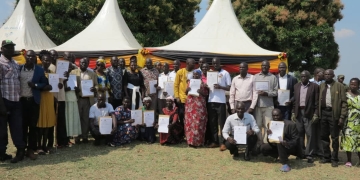
Masheda Mixed Farm a local aquaculture startup has rehabilitated and empowered about 500 street youths by teaching them aquaculture skills and providing employment opportunities.
The initiative, which started in 2020 during the COVID-19 pandemic, has given hope to formerly homeless youths, enabling them to earn a stable income and contribute to Uganda’s economy.
At the height of the pandemic, lockdowns left many without food or shelter, prompting Masheda Holdings Ltd to support vulnerable street children.
As the streets emptied and businesses closed, countless youths were left stranded, with no source of survival. Recognizing this crisis, Masheda Mixed Farm stepped in – not just to provide temporary relief, but to offer a long-term solution.
The farm took in hundreds of street children, rehabilitated them, and trained them in fish farming, particularly focusing on the highly nutritious cut fish (Emmale).

Today, these once hopeless youths are skilled workers in aquaculture, helping to meet the growing demand for processed cut fish both locally and internationally.
Mavin Lwasa, Managing Director of Masheda Mixed Farm, says the program has evolved significantly over the years.
“So far, Masheda Mixed Farm has directly impacted, skilled, and trained about 500 street youths under this program,” Mr Lwasa said.
“We conceptualized this initiative in 2020 when unemployment and crime rates were alarmingly high. Many of these youths had turned to petty crimes like phone snatching just to survive. We wanted to change that by skilling them in aquaculture, giving them a productive means of earning a living.”
Initially, Masheda Mixed Farm trained 300 street youths in various aspects of fish farming, from pond construction to fish harvesting and processing.
The success of the initiative led to an expansion, and today, 500 former street youths have been transformed into skilled fish farmers and factory workers.
One of the most remarkable aspects of this initiative is its ripple effect. Beyond just offering employment, Masheda Mixed Farm has empowered many of these youths to start their own fish farms.
The company now sources fish from some of the youths who once relied entirely on its support, turning them into independent business owners.
“Some of them have started their own ponds, and we source from them,” Mr Lwasa explained.
“This has created a sustainable income for them, allowing them to support their families and contribute to their communities. It’s a true example of socio-economic transformation.”

Through this program, not only have crime rates reduced, but Uganda’s aquaculture sector has also gained a skilled workforce that is driving growth in fish production and exports.
Masheda Mixed Farm, located in Buyala, Mpigi District, specializes in the farming of cut fish, a highly nutritious fish that is in high demand across Africa.
The farm spans seven acres of land and features ponds and hatcheries. It is well-organized into sections that facilitate the steady supervision of cut fish at every stage, from early development in the hatchery to the pond stage, and finally, the harvesting period.
The farm also has its own factory where cut fish undergoes final processing and packaging. This well-equipped facility is operated by skilled machine operators, many of whom were once street youths before being trained and empowered through the farm’s rehabilitation program.
According to Lemar Sam, a farm expert, it takes up to six months for the harvested fish to be ready.










Discussion about this post